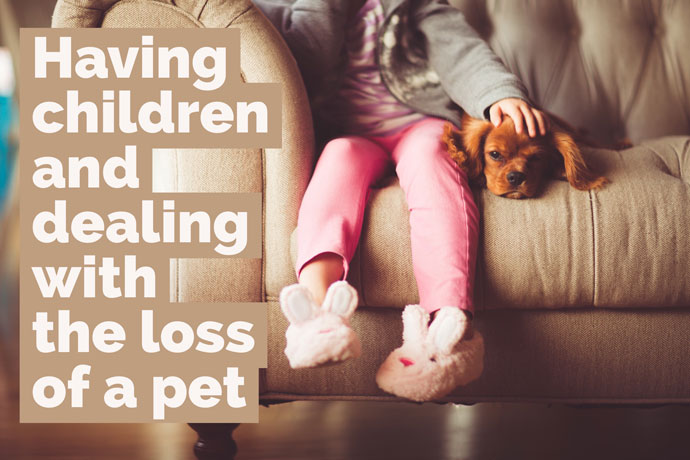Losing a pet is often the very first experience of grief our children have. Whether your pet is a fish, hamster cat or dog, it makes no difference the feelings are still the same.
In the last two years, this has been very real for us too. We’ve lost our beautiful dog and most recently our cat. Both were very old and both are sadly missed. For us, they were our furbabies and for our children excellent companions and comrades in many a mischief.
I had already experienced pet loss as a child, and when our dog died I talked to my children about how it felt when I lost my dogs. I wanted them to know that the sadness they felt wasn’t going to last forever.

Children greave in a very different ways to adults, and I think we forget how confusing death can be for them. They grieve for shorter periods of time and because of this, you should remember their grief is no less intense than that of yours an adult. Children usually return to the subject again and again; so patience and tolerance are needed when helping your grieving child.
Age usually shapes how they view the death of a pet. For adults, its produces a chain of emotions, these steps of grief are denial, for me I could hear the dog as if she was still there, snoring and moving in her bed. It was like audible muscle memory. Then came the sadness and depression. Followed by an overwhelming sense of guilt and anger. Could I have done more for her, why didn’t I do more? And, finally the relief. I’m at peace now when I think about her or spot another dog like her in the street. However, with kids, their stages can vary depending on their age and how mature they are.
Two and Three-Year-Olds usually have no understanding of death at all. They often think of it as sleeping. Kids in this age group may show signs of general distress and will readily accept another pet in place of the dead one. Which for you, the adult can be distressing as you may not be ready to move on yet just. But feel you need to do to help your child. I’ve known many parents who do this. Only you know your child and will feel if this is right.
At four, five, and six their understanding is better, but you may find that your child still thinks of death as a continued existence, ie, that their pet is off living happily somewhere else or again just sleeping. They may also start to fear or ask questions about their death. So talking openly and regularly about how they feel can be really helpful. It’s also not uncommon for kids to wet the bed and suffer changes in eating and their sleeping patterns.
For Seven, Eight, and Nine-Year Olds death now becomes very real to these children and some may start to think about the death of their parents. you may even be asked questions like “mummy will you die?” They could become very curious and you should respond as honestly as you feel to questions as they come up. You could also see a few issues at school with, antisocial or even aggressive behaviours.
For children aged ten plus they should now understand that death is natural and universal. They will often react to death like adults. Teenagers may show some forms of denial. Usually a lack of emotional display. As a result, these young adults may be experiencing genuine grief without any outward signs at all.
We always encourage our children to talk about the cat and the dog and we discuss death, dying and grief as honestly as we can with them. Coupled with healthy dose of hugs and reassurances. It’s also a good idea to tell teachers and school about your pet’s death too.
By giving your children the space to work through how they feel in their way along with your love and support. You’ll be able to get through your loss together.
I’m not ready for another cat or dog just yet, but in time I will be.